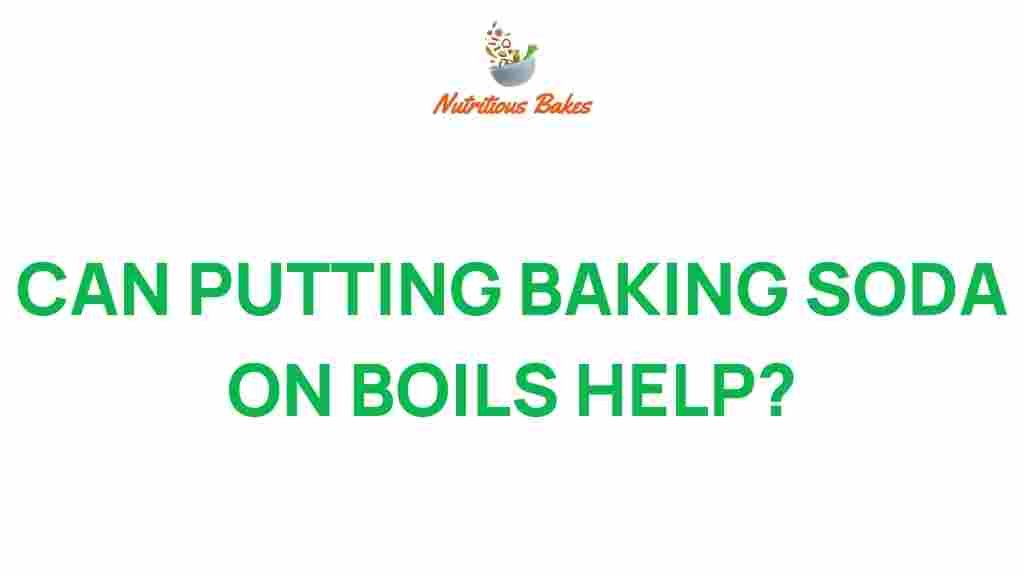Can Baking Soda Be the Secret Weapon Against Boils?
Boils can be a painful and uncomfortable experience, often caused by bacterial infections that lead to inflamed, pus-filled lumps on the skin. While there are numerous treatments available, many people are turning to baking soda as a potential home remedy for boils. This article explores the effectiveness of baking soda in treating boils, along with other natural treatments that can promote skin health and healing.
Understanding Boils
Before diving into the remedies, it’s essential to understand what boils are and how they form. Boils, also known as furuncles, occur when hair follicles become infected with bacteria, typically Staphylococcus aureus. This infection leads to inflammation and the formation of a painful lump filled with pus.
Causes and Symptoms of Boils
Boils can develop due to several factors, including:
- Poor hygiene
- Blocked hair follicles
- Weakened immune system
- Skin conditions like acne
- Friction from clothing
Common symptoms of boils include:
- Red, swollen lump on the skin
- Pain and tenderness around the area
- Pus or fluid drainage
- Fever in severe cases
Benefits of Using Baking Soda for Boils
Baking soda (sodium bicarbonate) is known for its versatile uses, from baking to cleaning. However, it also has properties that can benefit skin health. Here are some reasons why baking soda might be considered a secret weapon against boils:
- Anti-inflammatory properties: Baking soda can help reduce inflammation, alleviating some discomfort associated with boils.
- Antimicrobial effects: It may help fight bacteria, potentially reducing the risk of infection.
- pH balancing: Baking soda can help maintain the skin’s natural pH, promoting healing.
How to Use Baking Soda for Boils
If you’re considering using baking soda as a home remedy for boils, follow this step-by-step process:
Step 1: Prepare a Baking Soda Paste
To create a baking soda paste, you will need:
- 1 tablespoon of baking soda
- Water (enough to form a paste)
Instructions:
- In a small bowl, mix the baking soda with water.
- Stir until you achieve a thick paste consistency.
- If desired, you can add a few drops of tea tree oil, known for its antibacterial properties.
Step 2: Apply the Paste
Once your paste is ready:
- Gently clean the affected area with mild soap and water.
- Pat the skin dry with a clean towel.
- Apply the baking soda paste directly onto the boil.
- Cover with a clean bandage or gauze.
Step 3: Leave it On
Allow the paste to sit on the boil for at least 20-30 minutes. This will give the baking soda time to work on the inflammation and bacteria.
Step 4: Rinse and Repeat
After the time is up:
- Rinse the area with warm water.
- Pat dry and reapply the paste 2-3 times a day until the boil begins to drain or heal.
Additional Home Remedies for Boils
While baking soda is a great option, several other home remedies can aid in treating boils and promoting skin health:
1. Warm Compresses
Applying a warm compress to the boil can help increase circulation and promote drainage. Simply soak a clean cloth in warm water, wring it out, and apply it to the affected area for 20 minutes several times a day.
2. Turmeric Paste
Turmeric is known for its anti-inflammatory and antimicrobial properties. Create a paste by mixing turmeric powder with water and applying it to the boil.
3. Tea Tree Oil
Tea tree oil is a powerful natural antiseptic. Dilute a few drops of tea tree oil in a carrier oil and apply it to the boil.
4. Aloe Vera Gel
Aloe vera can soothe the skin and promote healing due to its anti-inflammatory properties. Apply fresh aloe vera gel directly to the boil.
Troubleshooting Tips
When using home remedies for boils, it’s important to monitor the situation. Here are some troubleshooting tips:
- If the boil does not improve after a few days of treatment, consider consulting a healthcare professional.
- Do not squeeze or pop the boil, as this can spread the infection.
- If you notice increased redness, swelling, or fever, seek medical attention.
- Maintain proper hygiene to prevent future boils.
Conclusion
Baking soda can be a valuable addition to your home remedies arsenal for treating boils. Its anti-inflammatory and antimicrobial properties may help alleviate discomfort and promote healing. However, it’s crucial to remember that while baking soda can assist in managing boils, persistent or severe cases may require medical treatment.
Incorporating other natural treatments such as warm compresses, turmeric, tea tree oil, and aloe vera can further support skin health and wellness. Always prioritize hygiene and consult a healthcare professional when necessary.
For more information on natural treatments for skin health, check out this resource on home remedies.
Remember, taking care of your skin is an essential part of your overall wellness journey. With the right approach, you can effectively manage boils and promote healing naturally.
For expert advice on skin care, you can visit this external link.
This article is in the category Tips and created by NutritiousBakes Team
